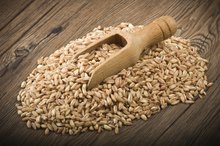Kamut & Gluten
On a gluten-free diet, wheat, barley and rye are off limits. You may be directed to eat “alternative” grains, such as teff and amaranth, as substitutes. Kamut is not among these alternatives, however, as it is an ancient relative of durum wheat. Cereals, breads and baked goods made with kamut contain gluten.
Celiac Disease
People with the autoimmune condition celiac disease cannot eat gluten, a protein in wheat barley and rye. If you have celiac disease, ingesting gluten causes damage to the villi of the small intestine, resulting in malnutrition, digestive distress and long-term health problems. A study in the journal “Gastroenterology” published in July 2009 reported that people who have undiagnosed celiac disease may a have a fourfold increase in their risk of death. Avoid not only wheat, but wheat relatives such as kamut, to help manage your condition.
Kamut
Substitution for Wheat Germ
Learn More
Kamut is a brand of Khorasan wheat. Kamut is not gluten-free, but it is a high-protein alternative to wheat for people who can consume gluten. It provides 6 g of protein per cooked 1/2 cup serving, with only 1 g of fat. Kamut is a source of selenium, an antioxidant that helps boost immunity and fight disease.
Gluten Implications
For celiac sufferers, the amount of gluten in kamut or any other product does not matter. The smallest bit can set off symptoms and damage the intestines. The only way to treat celiac disease is to avoid gluten-containing grains, such as kamut, altogether.
Considerations
List of Wheat-Free Foods
Learn More
If you follow a gluten-free diet because of a gluten intolerance rather than diagnosed celiac disease, you may be able to digest kamut more easily than other types of wheat. However, if your doctor has instructed you follow a gluten-free diet, consult her before adding kamut to your diet. If you can eat gluten, consider kamut as an alternative to wheat or barley. It offers a mildly sweet flavor that can be used as a cereal, pilaf or ground flour for baking.
Related Articles
References
Writer Bio
Andrea Cespedes is a professionally trained chef who has focused studies in nutrition. With more than 20 years of experience in the fitness industry, she coaches cycling and running and teaches Pilates and yoga. She is an American Council on Exercise-certified personal trainer, RYT-200 and has degrees from Princeton and Columbia University.









